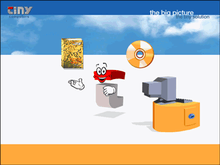Tiny Computers
Tiny Computers was a British computer manufacturer based in Salfords, Surrey, England.[2] The company went into administration due to 'substantial' losses in January 2002[3] and was subsequently purchased by rival OEM Time Group.[4]
 | |
| Private | |
| Industry | Computer hardware |
| Fate | Administration |
| Founded | 1996[1] |
| Defunct | 2002 (brand used until 2005) |
| Headquarters | , |
Number of locations | 150+ (United Kingdom) |
| Parent | OT Computers (1996–2002) Granville Technology Group (2002–2005) |
| Website | tiny |
History
Tiny Computers enjoyed great success during the latter half of the 1990s, having retail units throughout the United Kingdom as well as launching in the United States and the Far East. The company claimed to have sold 400,000 units in 2000,[5] and signed a contract worth £40m with Scottish manufacturer Fullarton Computer Industries in August 2001.
Tiny cited reduced air freight fees and a shorter, more efficient supply chain as their reason for choosing a firm based in the United Kingdom over Asian OEMs who had lower base costs.[6] However, due to increasing competition in the consumer PC market, their profits eventually began to fall, and in the beginning of 2002, they went into administration and were subsequently purchased by rival TIME.
Innovations
Home theater PC
In March 2001, the company released one of the first Home theater PCs, called the Takami system.[7] The PC was contained in a flat case with a similar form factor to a VHS player, and was intended to be placed under a television rather than at a computer desk as was typical during the 1990s. Bundles including a plasma television, and other home cinema equipment were also sold.
Despite its innovative nature, the Takami was not a commercial success, with only 5,000 units being sold during 2001.[8]

Tiny Trainer
In 2000, in an attempt to make computing easier for those who had little to no experience with PCs, Tiny commissioned e-learning company VSI Communications Group to create a 'virtual mentor' named Tiny Trainer. An interactive animation ran automatically when the PC first booted up and gave users a brief introduction to computers in general, the Windows operating system as well as Tiny's own online services.[9]
Tiny Trainer was based on the same technology platform as VSI's Mentor interactive help series, and was tightly integrated with a Tiny specific Windows ME version of Mentor that also came bundled on Tiny's computers.
References
- "Company details for TINY COMPUTERS LIMITED". UKData.com. Retrieved 14 November 2014.
- "Company Overview of Tiny Computers". Businessweek. Bloomberg. Retrieved 19 November 2014.
- McLean, James (30 January 2002). "Tiny Computers pulls the plug". ThisIsMoney.co.uk. Retrieved 19 November 2014.
- "Tiny Computers Captured By Time". Sky News. 30 January 2002. Retrieved 19 November 2014.
- "Tiny Computers swallowed up". BBC News. British Broadcasting Corporation. 30 January 2002. Retrieved 19 November 2014.
- "Contract win brings Tiny boost". BBC News. British Broadcasting Corporation. 14 August 2001. Retrieved 19 November 2014.
- Blincoe, Robert (13 March 2001). "Tiny shows off home entertainment box". The Register (via Wayback Machine). Archived from the original on 26 June 2001. Retrieved 14 November 2014.CS1 maint: unfit url (link)
- Blincoe, Robert (16 October 2001). "Tiny's home entertainment boxes disappoint". The Register. Retrieved 14 November 2014.
- "British Computer Maker Bundles Mentor(TM) to Reduce Support Costs". PRNewsWire. 5 March 2001. Retrieved 20 November 2014.